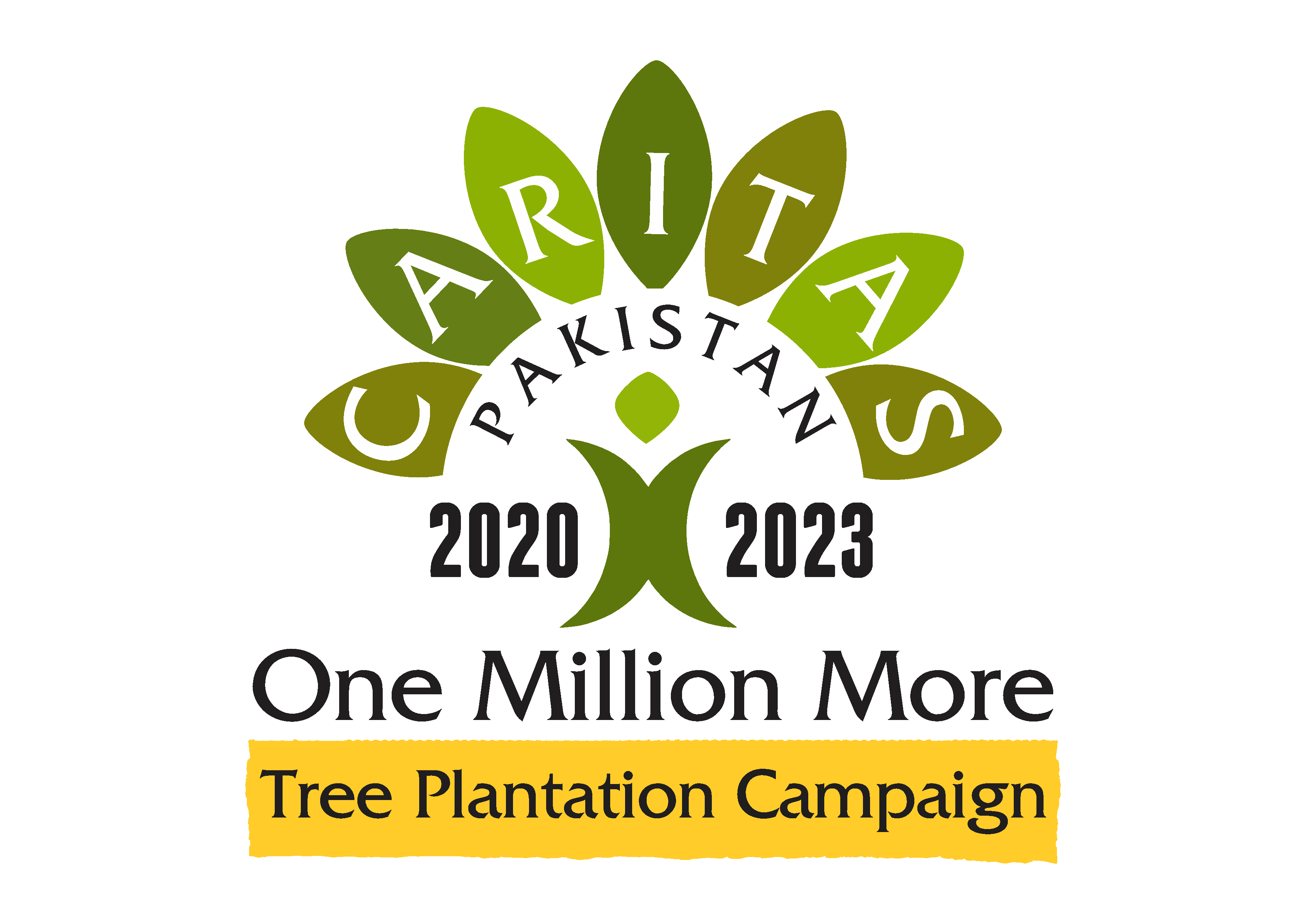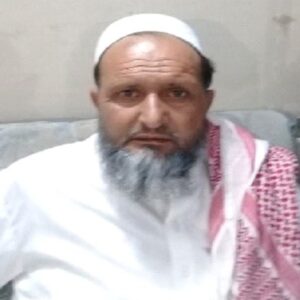No products in the cart.
2017 Case Study
Thank you to making it possible secure life
Caritas Pakistan Faisalabad is running its CBDRM project in different areas of District Jhang. My name is Rubina d/o Muhammad Aslam is resident of Moza Nikkan Balochan. This area is situated between two rivers and distance from River Jhelum is 1Km and Chenab is 7Km away. Every year, this area is hit by the monsoon season flood. Due to its vulnerability of the area, Caritas Pakistan Faisalabad started work for our community to combat the situation of disaster.
Caritas established DMC’s consisted of 30 members in which influential people, women and other community members were included. Except this, the organization held many capacity building trainings for the people. Before Caritas, no any other NGOs worked in this area and during flood we had to face many problems. We have had lost our necessary documents and we were unaware of their importance and safety. In 2017, Caritas worked in our area and organized different capacity building trainings.
Through the support of Caritas Pakistan, Rescue 1122 team came to us and gave us training that how to safe and secure life as well as essential documents, food preservation after prediction of flood or any other emergency. Resource person also told us about selection of safe place for safety. Before this, we used to live separately from one another in different places, but now we live together at safe found place.
After attending the training on provision of First Aid; people became able to handle any fracture or other ailments. These trainings put an encouraging and practical effect on the minds of people to tackle the situation.
Now, we are aware of necessary instructions to be taken before, during and after flood to safe and secure life. I am grateful to Caritas for its good work done in our area for vulnerable community and we are now able to handle any kind of disastrous situation.
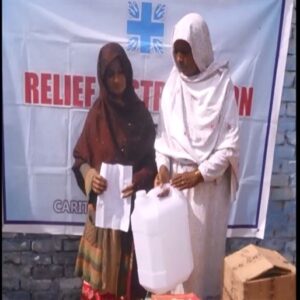
2018 Case study of Ms. Bushra Bibi 48 years old widow)
Bushra Bibi is a private health worker in Dulam Kalan, a flood prone area of Punjab province. Her husband, Muhammad Akram, was a farmer who dead in 2018.
Besides providing treatment and support to help her clients, Bushra sales milk and eggs to buy Fodder for her livestock and support her family.
Since 2014, she has faced at least three floods in Dulam Kalan, her village. In 2017, the boundary walls of her mud house collapsed due to torrential rain and five feet of standing water around her residence.
“I had spent all my savings to grow wheat crop. All of my standing crop was lost in the deluge. I felt so helpless, being female I never thought of working independently because it is not the culture of our families and society,” said mother of four.
“I had no knowledge about facing these annual disasters. The whole community suffered similar loses. While men tried to salvage the left overs, women and children developed skin disease, food deficiency and other health related problems.”
Bushra used to see Caritas volunteers in the field helping the locals in surrounding villages during emergencies. She was inspired by the humanitarian response, dedication of Caritas staff which helped the community irrespective of their religion and training sessions for the community.
“The government agencies and other NGOs almost forgot about us. There were no medical camps, emergency kits or WASH interventions,” she said.
In 2015, she attended an orientation, trainings by Caritas Pakistan Lahore staff at Hajli Mehtab pur village which is about 15 kilometers from her village. “I was greatly inspired by the training and methodology. They prepared us for future action and assigned us several roles, training etc. The training transformed me from an ordinary health worker to a community volunteer,” said 48-year-old widow.
Bushra Bibi invited Caritas Pakistan team in her village the next year. After organizing at least four general meetings with villages elders and local farmers, she was selected as a member of Disaster Management Committee DMC which consisted of 15 to 21 members. Since then, she has been heading the DMC that holds monthly meetings in the evening.
“We are always searching for proactive people having some knowledge to cope with flood and other disasters. We collect water from neighboring village by filling cans,” she said.
In 2017 monsoon affected both urban areas and traditional rural flooding. The overall death toll was of 177 people ,166 were injured and 426 houses were destroyed all over the country. The heavy rains resulted in the emergency of Dengue. Over 122,807 suspected cases were registered, 25,770 cases tested positive and 69 deaths recorded.
Caritas Pakistan organized distributions in small cluster to ensure effective crowd management and avoid security incidents. The time and location of the distribution was identified in consultation with CDG/DMCs and parish priests. Hygiene kits were provided to 1,440 households along with shelter kits. Beneficiaries were selected according to criteria adopted and agreed with community Development Groups
In 2018, Caritas Pakistan Lahore installed one tap and a washroom in houses of DMC members. Sessions on boiling drinking water for purification and preservation were also held. Caritas also installed one water tank, four taps, one wash basin and a toilet in Government Elementary Girls School where more than 300 students are presently studying from grade one to eight.
“The school-going children used to remain ill because of contaminated water from old water supply lines laid along sewerage system. A few used to skip their classes because of continual pain in stomach and related diseases. Now they are healthier,” said Bushra.
“Caritas program helped us through DMC. They also gave us cans to drink clean water. We were told to save boiled water in the cans then put it in the refrigerator in the morning. Now we drink water at our home.”
With the help of her sons, Bushra also takes accident victims and others to hospitals.
“We are running committee successfully and smoothly. We have made small committees to collect money. We use this money to help the poor, if someone does not donate then we knock on the doors of wealthy people. We are not shy of requesting others. We are bound to help the poor; it is a duty from Allah as well.”
THE END
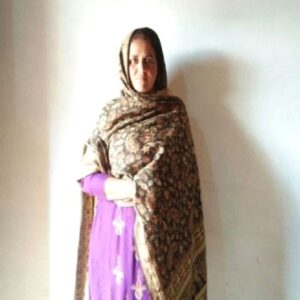
2019 Case study of Ms. Rubina
Thank you to making it possible secure life
Caritas Pakistan Faisalabad is running its CBDRM project in different areas of District Jhang. Rubina d/o Muhammad Aslam is resident of Moza Nikkan Balochan. This area is situated between two rivers and distance from River Jhelum is 1Km and Chenab is 7Km away. Every year, this area is hit by the flood of Monsoon season. Due to its location in the flood affected area, Caritas Pakistan Faisalabad started work for vulnerable community to combat the situation of disaster.
Caritas established DMC’s consisted of 30 members in which influential people, women and other community members were included. Except this, the organization held many capacity building trainings for the people. Before Caritas, no any other NGO or GO worked in this area and during flood we had to face many problems. We have had lost our necessary documents and we were unaware of their saving. In 2017, Caritas worked in our area and organized different capacity building trainings.
In this regard, Rescue 1122 team came to us and gave us training that how to safe and secure life as well as essential documents, food preservation after prediction of flood or any other emergency. Resource person also told us about selection of safe place for safety. Before this, we used to live separately from one another in different places, but now we live together at safe found place. After attending the training on provision of First Aid; people became able to handle any fracture or other ailments. These trainings put an encouraging and practical effect on the minds of people to tackle the situation.
Now, we are aware of necessary instructions to be taken before and during flood to safe and secure life. I am grateful to Caritas for its good work done in our area for vulnerable community and we are now able to handle any kind of disastrous situation.
2- Case study of Ms. Kiran Qamar – DRR Volunteers
Area: Sadiq Nagar, of St. Philips Parish, District Central, Karachi.
Name: Kiran Qamar
She introduced herself by saying that my name is Kiran Qamar, is the native of the area and living in the area since last decade. I am working as a Teacher in private school. I am married and having four children. My area (Sadiq Nagar) is situated at the bank of Gujar Nala. The area diameter is around 18 km. Whenever Karachi is hit by rain Gujar Nala spills out water due to which our areas streets and houses become completely over flooded. The flood not only spreads rain water but contain contaminated water, filth and compounds of industrial chemicals as well. This water prevails skin and infectious diseases among the community of my area.
Change in my life:
I joined as a volunteer in the project of DRR with Caritas Pakistan Karachi. I acquired following trainings under Disaster Risk Reduction with their organization:
⦁ Disaster Preparedness.
⦁ Search and Rescue.
⦁ Disaster Management.
⦁ Hazard Mapping.
⦁ Evacuation Plan.
⦁ First Aid and CPR.
⦁ Early Warning System.
Before the above trainings I was never told how to tackle with the conditions during the time of disaster. But now I am able to manage accordingly and even guide and help out others more efficiently. This has also helped us a lot to learn how to avoid huge damages of life and properties in our area.
For example, during the year 2019 before the monsoon season with the coordination of DMC and Caritas Pakistan Karachi, I conducted training session over awareness for disaster and monsoon preparedness. We also maintained early warning awareness system to aware the local community. Due to this activity the people of the area managed to face the flood during the rain flood 2019 with more enthusiasm and courage. Hence they were less affected during the rain flood hit during 2019 as they used to get before.
Therefore, I am rightly proud and happy to be associated with Caritas Pakistan Karachi as a volunteer in their DRR program. I am very well satisfied with what I learnt from them has made me able to help myself and my community as well.
Thank you Caritas Pakistan.
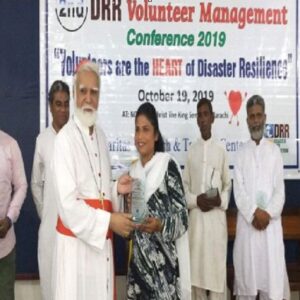
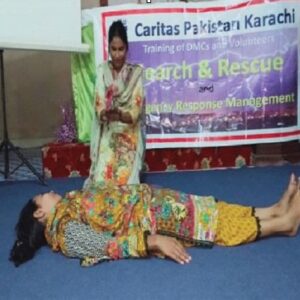
2020 Case studies from Field
Case study of Mr. Sher Alam Khan 60 years old, Swabi District, Province Khyber Pakhtunkhwa)
Sher Alam Khan wears his assault rifle whenever diocesan unit of Caritas Pakistan in northern Khyber Pakhtunkhwa province holds distribution of flood relief aid in his village. His group of young gunmen surround the venue for protection of both aid workers and the relief items.
“Every man has at least one gun of his own. It is a part of our dress, “smiled the 60 years old Disaster Management Committee (DMC) member of Turlandi village in Swabi District.
Khan, a farmer, owns 14 canals (7082 square meters) of farm at the bank of River Kabul that emerges from Hindu Kush mountains in Afghanistan and empties into the Indus River near Attock, Pakistan.
The province of Khyber Pakhtunkhwa since long remained the stage for natural calamities and War on Terror. At one time it would be a victim of millions of Afghan refugees pouring into it due to the Soviet invasion of Afghanistan and at another, it would be faced with floods causing severe damage to the local infrastructure.
North Waziristan and certain other tribal districts serve as a gateway to Khyber Pakhtunkhwa and rest of Pakistan and provide a conduit to militants planning terrorist strikes not only in Peshawar, but also in Lahore and beyond.
Sher Alam became acquainted with Caritas Pakistan in 2010 when about 20 million people were affected by the relentless monsoon rains leading to massive flooding from the mountainous regions in the north to the river plains of the south. About one-fifth of Pakistan was submerged, and entire families waded through filthy water, pleading for help. More than 1,400 people died.
Sher Alam also lost the standing of crop of maize, vegetables and fodder. Caritas Pakistan helped villagers of Turlandi with food items, hygiene kits, kitchen items and tree plantation. The diocesan unit of Islamabad-Rawalpindi also erected protection walls and cemented drains in the village. More than 50 people attended trainings on rescue, usage of rescue kits and identifying escape routes.
Sher Alam used to volunteer for the charitable arm of an Islamist political party. The experience of working with relief organization helped him in managing two DMCs in Turlandi village.
“Caritas team worked on the basis of human empathy and treated us all equally, we have more volunteers registered since PEACH project and efforts are appreciated. I think it has added value in DMCs working under CBDRM Project. I was awardee with shield by Caritas Pakistan which became inspiration to other to join Caritas Pakistan efforts in serving communities.” he said adding the security measures aimed at preventing any attempted looting.
Desperation erupted into violence in flood-ravaged Pakistan in 2010, as survivors awaiting receive aid scrambled to put food in their empty bellies. People in Sindh province blocked a highway to protest the slowness of aid delivery and clashed with police. In a hard-hit district of Punjab, hungry mobs unloaded two aid trucks headed to a warehouse. Local aid agencies reported other incidents of looting.
Aid agency workers said distributions were hampered because of the crowds stopping the convoys and because large numbers of people were living along the road. In 2014, hundreds of flood victims attacked trucks carrying food supplies in Chund Bharwana town of Jhang in Punjab province. The incident led to a clash between the flood affectees as they snatched relief goods from each other.
Sher Alam still calls monthly meeting of DMCs in village. The recent meetings discussed and fully supported efforts towards cleaning the drains and other outlets, built by Caritas Pakistan in 2010, before arrival of monsoon rains in upper and central parts of the country.
“In usual days we try to help each other by sharing contacts in police cases or issues relating to complications in identity cards and passport. Other people are still invited to come and see our movement,” he said.
“Caritas plants have also started bearing fruits which are served in these meetings or given to guests as souvenirs. Cardamom especially tastes good.”

Case study of Ms. Bushra Bibi 48 years old widow)
Bushra Bibi is a private health worker in Dulam Kalan, a flood prone area of Punjab province. Her husband, Muhammad Akram, was a farmer who dead in 2018.
Besides providing treatment and support to help her clients, Bushra sales milk and eggs to buy Fodder for her livestock and support her family.
Since 2014, she has faced at least three floods in Dulam Kalan, her village. In 2017, the boundary walls of her mud house collapsed due to torrential rain and five feet of standing water around her residence.
“I had spent all my savings to grow wheat crop. All of my standing crop was lost in the deluge. I felt so helpless, being female I never thought of working independently because it is not the culture of our families and society,” said mother of four.
“I had no knowledge about facing these annual disasters. The whole community suffered similar loses. While men tried to salvage the left overs, women and children developed skin disease, food deficiency and other health related problems.”
Bushra used to see Caritas volunteers in the field helping the locals in surrounding villages during emergencies. She was inspired by the humanitarian response, dedication of Caritas staff which helped the community irrespective of their religion and training sessions for the community.
“The government agencies and other NGOs almost forgot about us. There were no medical camps, emergency kits or WASH interventions,” she said.
In 2015, she attended an orientation, trainings by Caritas Pakistan Lahore staff at Hajli Mehtab pur village which is about 15 kilometers from her village. “I was greatly inspired by the training and methodology. They prepared us for future action and assigned us several roles, training etc. The training transformed me from an ordinary health worker to a community volunteer,” said 48-year-old widow.
Bushra Bibi invited Caritas Pakistan team in her village the next year. After organizing at least four general meetings with villages elders and local farmers, she was selected as a member of Disaster Management Committee DMC which consisted of 15 to 21 members. Since then, she has been heading the DMC that holds monthly meetings in the evening.
“We are always searching for proactive people having some knowledge to cope with flood and other disasters. We collect water from neighboring village by filling cans,” she said.
In 2017 monsoon affected both urban areas and traditional rural flooding. The overall death toll was of 177 people ,166 were injured and 426 houses were destroyed all over the country. The heavy rains resulted in the emergency of Dengue. Over 122,807 suspected cases were registered, 25,770 cases tested positive and 69 deaths recorded.
Caritas Pakistan organized distributions in small cluster to ensure effective crowd management and avoid security incidents. The time and location of the distribution was identified in consultation with CDG/DMCs and parish priests. Hygiene kits were provided to 1,440 households along with shelter kits. Beneficiaries were selected according to criteria adopted and agreed with community Development Groups
In 2018, Caritas Pakistan Lahore installed one tap and a washroom in houses of DMC members. Sessions on boiling drinking water for purification and preservation were also held. Caritas also installed one water tank, four taps, one wash basin and a toilet in Government Elementary Girls School where more than 300 students are presently studying from grade one to eight.
“The school-going children used to remain ill because of contaminated water from old water supply lines laid along sewerage system. A few used to skip their classes because of continual pain in stomach and related diseases. Now they are healthier,” said Bushra.
“Caritas program helped us through DMC. They also gave us cans to drink clean water. We were told to save boiled water in the cans then put it in the refrigerator in the morning. Now we drink water at our home.”
With the help of her sons, Bushra also takes accident victims and others to hospitals.
“We are running committee successfully and smoothly. We have made small committees to collect money. We use this money to help the poor, if someone does not donate then we knock on the doors of wealthy people. We are not shy of requesting others. We are bound to help the poor; it is a duty from Allah as well.”
THE END
